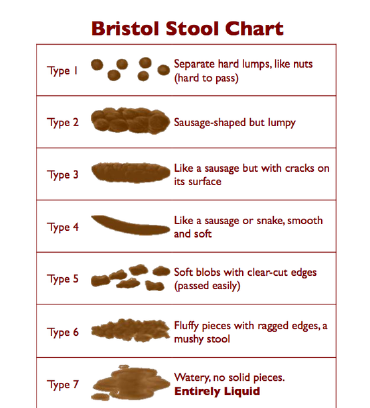Hello Everyone! I hope you are well rested, hydrated, and feeling at your best today. Today’s blogpost is about awareness of what goes out of us! Yep, poop! We talked about urine color analysis on my last post. If you have tried Dr. Batmanghelidj’s recommendation take note on how you are feeling energy-wise but also how well you are eliminating as well. His water recommendation helps with hydration as well as detoxification. We ingest so many toxins in the air we breathe and food we eat. Our water intake can help with this. The best solution for pollution is dilution. For those using his or other hydration guidelines, keep monitoring your urine color to gauge your hydration. You will be able to gauge your elimination by analyzing your feces. Self analyzing stools can tell you about diet, fluid intake, illness, lifestyle, and medication effects. I am going to do this post in a question/answer format.
1. What is a good poop?
A well formed stool looks like a brown banana. It is consistent in contour, passes easily, smell natural (earthy), and should float. If they sink and stink (really foul!) it could be indicative of an intake of processed foods, a toxic environment, or the effect of medications. Check with your Doctor on the side effects of any medication you take. Eating more plant foods may help to attain a floating poop. Type 3 and 4 our the healthy poops. Type 4 is the most desirable!
2. How often and how much should I poop?
It is generally accepted that 1-3 bowel movements a day is a good health indicator according to Dr. Lipski, author of Digestive Wellness. We should hopefully eliminate at least 12 inches per day of poop (Dr. Lawrence Wilson, MD and Paul Chek, HHP)
3. What is another good indicator of bowel health?
Another good indicator is bowel transit time. This is how long a food item takes to get from mouth to anus. The usual time is 12-24 hours. On average many people have a transit time of 48-96 hours. This could be indicative of diets low in fiber, poor hydration, or not enough magnesium intake. A simple home test can be to eat 3-4 whole beets and see when they come out. Beets will turn your stool a deep garnet red. If it takes longer than 24 hours to turn up this indicates that wastes are sitting in your colon too long (Lipski, 2012). Consider more fiber, water, stress management, and exercise to help move your bowels along. Remember if you have concerns about your bowels a visit to your doctor is a good plan. Like anything else in regards to health there is always some variability with regards to numbers and norms.
4. What happens if poop stays in our colon too long?
If you ignore your urge to poop, more water is reabsorbed back into the body and the stool becomes dry and hard making them harder to pass. Not to mention that your bile acids concentrate irritating your colon lining and you have substances that our toxic to your body that need to leave. Listen to your body signals. If you have to go, go! Don’t entrain your body to suppress the urge. Otherwise, this can lead to constipation.
5. What foods are healthy to consume?
My recommendations are simple, eat as many whole foods as you can. Reduce the number of foods with labels as possible. And consider the source of the food. In terms of the amount of carbohydrates, proteins, and fats one should consume, I think this is very individual. Have you ever noticed that many of the top experts in medicine and nutrition disagree with each other on this? This indicates to me that there are other factors to consider. It is important to listen to what your body tells you following a meal. Their are signs and symptoms that indicate whether your ratios of fat, protein, or carbohydrates are not optimal. Perhaps for another post. We are unique on the inside as well as outside!!
This is about all I will cover in this post regarding poop. Bowel awareness is important as it indicates the health of our digestive and eliminative systems. Considering that this effects our nutrient absorption, immunity (most of it resides in your digestive system), and overall vitality I think it is a important for all of us to monitor. The above points are the tip of the iceberg. Three great books for those who want to know more are: How to Eat, Move, and Be Healthy by Paul Chek, HHP, You are Not What you Eat by Van Clayton Powel and Digestive Wellness by Elizabeth Lipski Ph.D.
If you are hydrating, digesting, and eliminating well, now you set the foundation to get active! My next blog post will discuss getting started with physical activity. For now, your next awareness homework besides examining your stools is to think about why you want to get healthy? What is your dream and purpose in life? Knowing this can supply the motivation to start and continue a program of wellness. Wellness can provide an important driving force in reaching your goals!!

